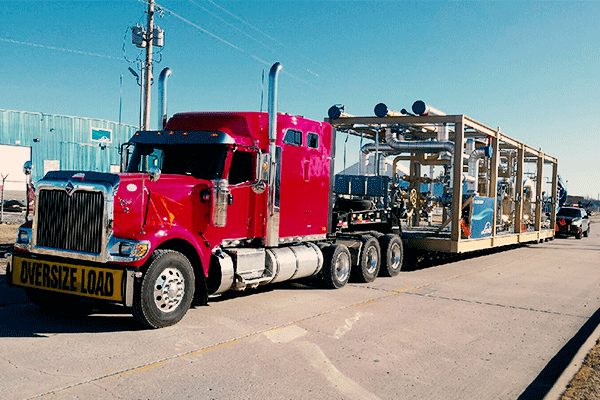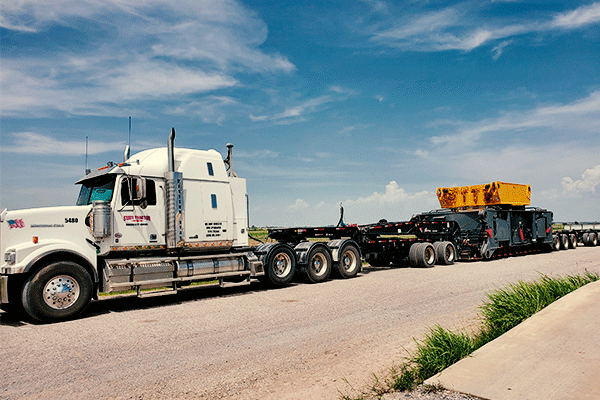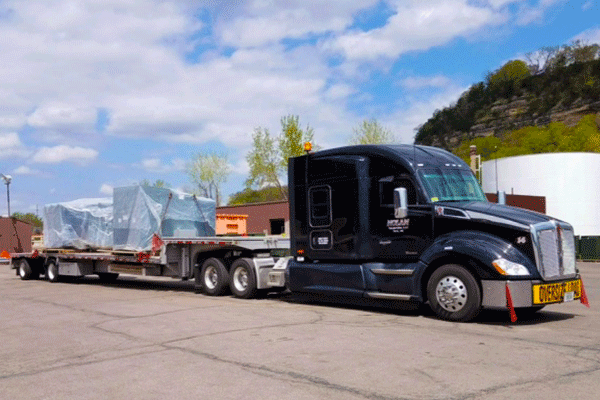
Getting the most from your supply chain often comes down to how well your transportation providers fit your needs.
That said, this industry is huge. With new trucking companies, freight brokers and 3PLs popping up every day, it can be difficult to figure out which logistics provider will match your business best. And choosing one from the field doesn’t seem feasible or, for that matter, possible.
Couple in the fact that adding the wrong providers to your network can cost you money as you fail to meet deadlines, and the stakes rise even further.
Here at ATS Logistics, we’ve found success operating as a traditional freight brokerage since 1989. As such, we understand the inner workings of this industry including what each type of transportation company brings to the table and who they fit best.
In this article, we’ll outline the things you should know when selecting whether to add a third-party logistics provider or freight brokerage to your transportation network.
Each of these providers has its own set of competencies and goes about servicing customers in different ways.
Below, we’ll outline:
- What a third-party logistics provider is.
- What the duties of a 3PL are.
- What the advantages of working with a 3PL are.
- What the disadvantages of working with a 3PL are.
- What a freight brokerage is.
- What the duties of a freight brokerage are.
- What the advantages of working with a freight brokerage are.
- What the disadvantages of working with a freight brokerage are.
What is a Third-Party Logistics Provider (3PL)?
A third-party logistics provider — commonly referred to as a 3PL — is a company dedicated to managing various supply chain services for its customers. Although their service offerings and level of involvement vary on a case-by-case basis, 3PLs make their hay by taking on a large section of their customer’s logistical management.
3PLs lean on their expertise, network of partners and a variety of technologies to offer their services at the highest level. And, for the businesses whose needs they fit, a 3PL can be a highly competent, and effective, third-party provider.
What Are The Duties of a 3PL?
One of the main selling points of utilizing a third-party logistics provider is the wide breadth of services they offer. Depending on their customer’s needs, 3PLs can manage many aspects of their supply chains. This includes, but isn’t limited to:
- Vetting and selecting logistics partners
- Scheduling all inbound freight
- Scheduling all outbound freight
- Warehousing
- Distribution center interactions
- Paying freight bills
- Holding RFQs
- Creating packaging for products
- Coordinating with consignees and carriers
Using their technologies and integrating with their customers’ systems — coupled with their seasoned expertise — 3PLs ensure that each of their duties is administered at the highest level. The best 3PLs employ entire teams and work with vast networks of providers dedicated to serving as their customer’s logistics department.

What Are the Advantages of Using a 3PL?
Many companies find a high level of success in partnering with a 3PL. These providers help their customers manage as many aspects of their inbound and outbound freight movement as they need. With their assistance, a company’s ability to oversee and maximize its supply chain becomes far more manageable.
The four main advantages of using a third-party logistics company are:
- Increased supply chain efficiency
- Improved transportation spend analysis
- Saved time can be focus elsewhere
- Transportation experts join your team
Let’s talk a bit about each of these 3PL core benefits.
1. Increased Supply Chain Efficiency
To do their jobs well, 3PLs continuously work to optimize their customer’s supply chains. How can these processes be improved? Is there a way to save costs on inbound freight? Would another warehousing option make more sense logistically?
These, and questions like these are consistently asked, and solved for, by the best 3PLs.
And, for their customers, a 3PLs oversight helps keep their supply chains running at maximum efficiency.
Barring any issues, trucks of raw materials (where applicable) show up when needed, fees are paid on time, RFQs are held whenever necessary and consignees receive freight as scheduled.
2. Improved Transportation Spend Analysis
With so much on their plate, it can be difficult for many companies to truly quantify the total amount of money they spend procuring and managing transportation services over a set period.
How much did it cost to get those shipments out the door and, more importantly, what can I do to cut down costs in the future?
Working with a 3PL helps shippers with these questions, answer them. With the benefit of their oversight and expertise, companies that hand portions of their supply chain logistics to a 3PL are better able to forecast their spending into the future by looking at past trends — information given to them by their provider.
In an industry that’s all about making adjustments where needed, a 3PLs provides value by recording all spending activities and suggesting ways to optimize.
3. Saved Time That Can Be Focused Elsewhere
As their outsourced logistics provider, 3PLs give the shippers they work with the added benefit of more time. In the business world, and everyday life, there never really seems to be enough time. That said, by taking control of and overseeing all of their customer’s logistics, 3PLs give them a bit more to work with.
Instead of facing the challenge of managing their supply chain logistics, these shippers can spend their time more effectively by focusing on the pieces of their business they’re best at.
4. Transportation Experts Join Your Team
The transportation industry is dynamic. Best practices are constantly changing and with over 700,000 trucking companies to choose from, it takes a sharp-expertise to pick the best of them.
You’re an expert when it comes to your business, your product and your industry. When it comes to managing a transportation supply chain, though, 3PLs hold the expertise.
Their job is to stay abreast of current inventory management best practices, invest in the best transportation technologies and come through for their customers every step of the way.
As such, partnering with a third-party logistics company gives you the benefit of their expertise and oversight wherever you need it.

What are the Disadvantages of Using a 3PL?
Although there are plenty of benefits to utilizing a 3PL, especially if you’re looking for a hands-free approach to logistics management, third-party logistics companies aren’t the right fit for every business.
The major disadvantages of utilizing a 3PL for your transportation needs are:
- Developing supply chain management skills is difficult.
- Many customers become wholly reliant on their 3PL.
- The cost of implementation and transition.
1. Developing Supply Chain Management Skills Is Difficult
When I say that 3PLs manage every aspect of their customer’s supply chain, I mean it. These providers oversee, and take over, a massive portion of their customer’s logistics operations.
As such, these businesses don’t develop the skills needed to manage their freight in-house. Over time, companies without these competencies have trouble successfully detaching their business from that of their 3PL.
2. Many Shippers Become Reliant on Their 3PL
Sure, the best 3PLs are great at their jobs but the companies that use them never learn how to function without their assistance. As such, activities like holding an RFQ; managing their carrier network; scheduling inbound and outbound trucks and finding warehousing solutions, isn’t something they’re familiar with or good at.
And, since doing these things properly is essential to keeping their businesses running smoothly, many shippers become reliant on their 3PL.
If you’re a shipper who wants a bit more control of your supply chain, a third-party logistics company won’t fit your needs. Although you’re generally able to select which services you’d like your provider to shoulder and those you wouldn’t, 3PLs make it a bit too easy to hand everything over.
In a nutshell, 3PLs present one additional hoop — for those businesses looking for a bit more control — to jump through.
3. The Cost of Implementation and Transitioning
The initial stages of adding a third-party logistics company to your business can be expensive in both time and money. You see, to give these companies the oversight they need to do their jobs effectively, takes a good bit of commitment on your part.
You’ll need to shoulder the costs associated with their presence without feeling the effects of their impact from the beginning. And, although the effect they’ll have on your supply chain will become evident once the transition is complete, in the beginning, 3pls feel expensive.
Additionally, fully committing your company to utilize a 3PL can, in some cases, be difficult. Larger shippers, for example, often find it challenging to shift their culture away from the ways of the past and toward their new normal — where a 3PL lends a hand.

What is a Freight Brokerage?
Like a 3PL, freight brokerages are a tool to help shippers manage their logistics. That said, brokerages — which come in several shapes and sizes — occupy a pretty specific lane.
Instead of offering holistic supply chain solutions and developing intimate control and oversight of their customer’s supply chain, freight brokerages simply help them get their products moving.
On the most basic level, freight brokers serve as the intermediary between a shipper with goods to move (their customers) and the carrier (a trucking company) with the means to do so.
By maintaining relationships and comprehensively vetting a network of trucking companies, freight brokers can match their customer’s goods with the “best-fit” truck in their area. Typically, this helps their customers save a bit of money as they don’t need to search for a great trucking company on their own.
What Are The Duties of a Freight Brokerage?
As a whole, freight brokers have two essential duties:
- Finding and vetting reliable carriers.
- Helping their customers maximize their supply chains.
For a brokerage to do its job properly, finding and vetting trucking companies is essential. To add great companies to their network freight brokers lean on their expertise, and reference reliability and safety metrics to ensure they only utilize the best of the best.
Automated software systems — which track and record a trucking company’s history, creating a centralized place for a brokerage to reference this information — are crucial to the carrier vetting and selection process.
Only with the best carrier partners can a freight broker provide their service at the highest level. As such, make sure to ask all of your potential brokers about their processes.
Once a broker is comfortable in the quality and reliability of the carriers in their network, the work of moving your freight can begin.
Planning your shipment's journey from start to finish, no matter the resources needed is the second key function of a brokerage.
Whether you need to get your freight overseas, across the nation or simply to a nearby town, a freight brokerage will find the best possible solution to reach your destination.

What are The Advantages of Using a Freight Brokerage?
For the right company, a freight brokerage can be an excellent transportation provider. In a fast-paced world, having a competent freight brokerage — with a vast network of carriers — at your disposal can mean the difference between on-time delivery and a costly delay.
Here are three of the largest benefits of moving your freight with a brokerage:
- The money you save
- The convenience they offer
- The flexibility you gain
Let’s talk a bit about each of them. . .
1. The Money You Save By Working With a Broker
Freight brokers offer a third-party service. As such, the only way they make money is by connecting their customers with the right truck, in the right area, at the right price.
Since they do this using a combination of truck market visibility, technology and expertise — all of which take a significant investment (be it time or money) to develop — a freight broker saves their customers this investment.
Additionally, pricing in the transportation industry is subject to fluctuations as demand spikes and supply drops off regularly. As such, a freight broker’s expertise and oversight are key to ensuring that the price you’re paying to move freight will get the job done.
Often, freight brokers are even able to find your truck at a cost-savings to you.
2. The Convenience a Freight Brokerage Can Offer You
Sometimes, things go wrong in the trucking industry. Loads fail, trucks break down and adjustments need to be made.
In these situations, great freight brokerages answer the call. These companies pick up the phone and find their customers a power-only solution to keep their freight moving and their supply chains running.
Sure, a power-only trucker might not be the solution that your situation calls for but it does an apt job of illustrating the convenience of using a broker — no matter your needs.
The best brokerages will take the reins, lean on their expertise and put your supply chain first — at no inconvenience to you.
3. The Flexibility Freight Brokers Offer
Freight brokerages grant their customers flexibility in a couple of ways.
Not only do these transportation providers give the businesses they work with the opportunity to step back and focus on other things, but they offer flexibility in modes of transport and service type.
The best brokers have a wide network of carriers, granting them the ability to move many types of freight. From reefer to less-than-truckload, heavy haul trucking and everything in between, if you have freight to move, it’s likely your broker will be able to help you do so.
What are the Disadvantages of Using a Freight Brokerage?
Just like a 3PL, freight brokers boast their own set of disadvantages. For many companies, these downsides prove to be deal-breakers. As such, when deciding between a 3PL and freight broker, keep these in mind.
The two largest disadvantages of using a freight brokerage for your freight are:
- Their ability to “guarantee” an available truck.
- Selecting the right one can be hard
1. Freight Brokers Can’t “Guarantee” a Truck for Their Customers.
Freight brokerages aren’t trucking companies. They don’t own or operate any trucks or trailers nor do they employ any drivers. Freight brokers rely solely on their network of carriers, and the relationships they hold with each, to come through for them when it matters.
As such, brokers never have a “truck in hand” for their customer’s loads. They can’t walk down the stairs, shake hands with a trucker and send them off to pick up a load — a fact that discourages many shippers.
This question of “guaranteed” capacity also comes down to the variable of a brokerage’s size. As the size of a brokerage’s carrier network edges upward, the likelihood that they will have a truck available to haul your shipment steadily increases.
That said, if you’re a shipper that worries about a truck falling through because your provider can’t force dispatch them, brokerages with a small network won’t fit your needs.
Note: This problem of “guaranteed” capacity extends well beyond the business of freight brokerage to 3PLs and trucking companies as well.
2. Selecting the Right Broker Can Be Hard
Becoming a freight brokerage boasts fairly few barriers to entry. As a result, many companies — through their freight brokerage selection process — run into issues by picking a bad one.
And boy, are there plenty to choose from — more than 17,000 nationwide.
The wrong freight brokerage can severely damage your supply chain. As such, if you feel like a brokerage may be the partner you’re looking for, be sure to choose wisely.
Use the Freight Brokerage Selection Common Mistakes Guide to avoid the top five mistakes shippers make when selecting an unreliable brokerage. The right broker can be an excellent asset for your business, that said, you’ll want to avoid the bad ones.

3PL or Freight Brokerage: Which is Best For Your Business?
Now that you understand the duties and responsibilities of each of these providers, how they add value to their customers and where they might fall short, you’re ready for the next toward selecting a good transportation company.
Choosing between a 3PL and a freight brokerage isn’t an easy task. That said, the better you understand each of your options, what they bring to the table and what you should look for when choosing, the better off you’ll be.
To help you do just that, check out these pieces of additional content, created to give you the ability to make an educated decision.
Can I Trust a Freight Broker? (Debunking 8 Freight Brokerage Myths)
What Are the Different Types of Freight Brokers?
How Does a Freight Brokerage Make Money?
Finally, if you have any questions about how we here at ATS Logistics help customers meet their goals, deadlines and stick to their budgets, reach out. We’re always happy to assist you in any way you need.



